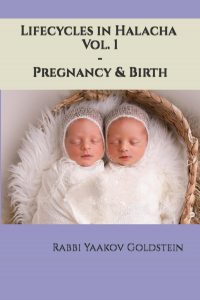Not to name after person who died tragically:[1]
It is customary not to name a child after an individual who died young [prior to age 60[2]]. [If, however, one adds a second name to the name, then one may be lenient.[3] One is to place the added name as the first name, and the name of the person who he is naming after as second.[4] Alternatively, one should slightly change the name from the origin, such as to call him Yeshaya instead of Yeshayahu.[5] Some Poskim[6] argue that the above adherence only applies if the person was killed and did not die a natural death on his bed, unless he died without children in which case one should not name a person after him.[7]]
Naming after tragically deceased parent:[8] The above rule is with exception to one who is naming the child after his or her father or mother, the grandparent of the newborn, in which case one may name after them even if they died tragically and young, being that the Mitzvah of honoring one’s parent protects one from any evil eye.
Naming after tragically deceased sibling: See next Halacha.
Naming after person who died Al Kiddush Hashem:[9] There is no issue with naming a child after an individual who was tragically murdered by Gentiles Al Kiddush Hashem. On matters like these, we apply the rule that those who are not particular we are not particular with them[10], and on the contrary, it is a great merit to name a child after a person who was killed Al Kiddush Hashem.[11] Accordingly, one may name children after those killed in the holocaust.
_______________________________________________________[1] Rashal in Yam Shel Shlomo Gittin 4:31 Os Yud Yeshaya; Beis Shmuel E.H. 129 Shemos Anashim Os Hei Hevel, and Os Yud Yeshayah; Chasam Sofer E.H. 2:25; Pischeiy Teshuvah 116:10; Bris Avos 8:31 and 36; Chosen Moshe 12:12; Sheilas Yitzchak 163; Igros Moshe Y.D. 2:122; Pesakim Uteshuvos 265 footnote 91; Sefer Shemiras Haguf Vihanefesh [Lerner] 154:2-3
[2] Nitei Gavriel 72:14 footnote 21 in name of Gedolim
[3] Rashal ibid; Beis Shmuel ibid; Igros Moshe Y.D. 2:122; Zocher Habris 24:9; Shevach Habris 20:14; Nitei Gavriel 72:10
[4] Hearos Radal in Aliyos Eliyahu footnote 51; Halichos Shlomo Hilchos Mila in name of Rav SZ”A
[5] Rashal ibid; Beis Shmuel ibid; Chasam Sofer E.H. 2:25 that for this reason we write the name Akiva with a Hei and not with an Alef, being that the Rebbe Akiva had his skin removed with combs of iron; Otzer Habris 6:8; Igros Moshe Y.D. 2:122; Shevach Habris 20:14; Nitei Gavriel 72:13
[6] Igros Moshe Y.D. 2:122; Shevach Habris 20:13
[7] The reason: As only when one is murdered is this a sign that he has a bad Mazal, in contrast to one who dies a natural death which is simply a sign that his set amount of years of this world have come to an end. [Igros Moshe ibid]
[8] Halichos Shlomo Hilchos Mila in name of Rav SZ”A; Maaneh of Rebbe in Shavuon Kefar Chabad Gilyon 954, printed in Shulchan Menachem 5:157, regarding grandparent; Igros Kodesh 12:434; Nitei Gavriel 72:11
[9] Sheilas Yitzchak 163-164; Machaneh Chaim E.H. 3:60; Igros Kodesh, printed in Shulchan Menachem 5:158 and Shaareiy Halacha Uminhag p. 243; Igros Kodesh 12:434; Shevach Habris 20:12 and 14; Nitei Gavriel 72:11 See regarding the Maalah of dying Al Kiddush Hashem: Tashbeitz 3:14 in name of Rivash, brought in Tzemach Tzedek E.H. 1:27-4, that by such cases we allow a woman to remarry, even if it happened to two of her husbands, as it is not her bad luck that caused her husband to die, but rather the merit of her husbands that caused them to be killed for the sanctity of God’s name.
[10] See Pesachim 110b
[11] Gilyon Kfar Chabad 712 p.13, printed in Shulchan Menachem 5:158



Leave A Comment?
You must be logged in to post a comment.